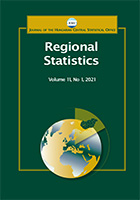Halo effect of diversification and polarization, and the role of relative deprivation based on the 2018 Swedish parliamentary elections results
Halo effect of diversification and polarization, and the role of relative deprivation based on the 2018 Swedish parliamentary elections results
Author(s): Dávid SümeghySubject(s): Social Sciences, Economy, Geography, Regional studies
Published by: Központi Statisztikai Hivatal
Keywords: radical right; halo effect; ethnic polarization; relative deprivation
Summary/Abstract: The starting point of electoral geographical analyses is that the geographical context influences voter behavior and party preferences. The role of context is particularly salient for radical right parties. The halo effect and neighborhoods' heterogeneity can also strengthen the radical right in a homogeneous central area. This research further expands the role of diversity as a contextual effect based on the 2018 Swedish parliamentary elections results. This study at the electoral district level has demonstrated that the rate of diversification plays an important role and generates a vote-boosting effect in the neighborhood of rapidly diversifying electoral districts. The halo effect theory was confirmed by the ethnic polarization index; a homogeneous central electoral district with polarized neighboring districts can also validate the conflict theory and generate extra votes for the radical right party. The study also looked at the relative economic deprivation of neighboring electoral districts, but this did not lead to clear results owing to the strong correlation between economic status and diversity. A worse economic situation relative to neighboring areas was only found to have a significant Sweden Democrat vote-boosting effect in areas with diverse neighboring areas.
Journal: Regional Statistics
- Issue Year: 12/2022
- Issue No: 01
- Page Range: 135-158
- Page Count: 24
- Language: English

